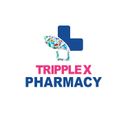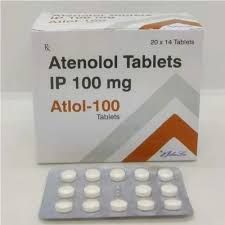Atenolol is a beta-blocker medication primarily used to treat high blood pressure (hypertension) and chest pain (angina). It works by blocking the effects of certain natural chemicals in the body, such as epinephrine, on the heart and blood vessels. This action helps to lower heart rate, reduce blood pressure, and decrease strain on the heart.
Indications
Atenolol is indicated for:
- Hypertension: Helps lower high blood pressure, reducing the risk of strokes, heart attacks, and kidney problems.
- Angina Pectoris: Used to relieve chest pain associated with heart disease.
- Post-Myocardial Infarction: Improves survival after a heart attack by reducing the workload on the heart.
- Arrhythmias: Can be used to treat irregular heartbeats.
Dosage
- Adults: The usual starting dose for hypertension is 50 mg once daily, which may be increased to 100 mg once daily based on the patient's response.
- Angina Pectoris: Initial dose is typically 50 mg once daily, which may be increased after one week if necessary.
Administration
- How to Use: Atenolol tablets should be taken orally with a full glass of water. They can be taken with or without food but should be taken consistently in relation to meals.
- Missed Dose: If a dose is missed, take it as soon as you remember. If it's almost time for your next dose, skip the missed dose and continue with your regular schedule. Do not double up.
Common Side Effects
Possible side effects may include:
- Fatigue or tiredness
- Dizziness or lightheadedness
- Cold hands or feet
- Nausea or vomiting
- Bradycardia (slow heart rate)
Serious side effects are less common but can include:
- Shortness of breath or wheezing
- Swelling of the legs or ankles
- Severe allergic reactions (e.g., rash, itching, swelling)
Warnings and Precautions
- Contraindications: Not suitable for individuals with severe bradycardia, heart block, or those allergic to atenolol.
- Caution in Patients with Heart Conditions: Monitor closely in patients with asthma, chronic obstructive pulmonary disease (COPD), or diabetes.
- Pregnancy and Breastfeeding: Consult a healthcare provider before use if you are pregnant or breastfeeding.
- Discontinuation: Do not stop taking atenolol suddenly without consulting a doctor, as this may worsen angina or lead to other complications.
Drug Interactions
Inform your healthcare provider about all medications you are taking, especially:
- Other antihypertensives
- Nonsteroidal anti-inflammatory drugs (NSAIDs)
- Medications for diabetes
Storage
Store at room temperature (15° to 30°C), away from moisture and direct sunlight. Keep out of reach of children.

